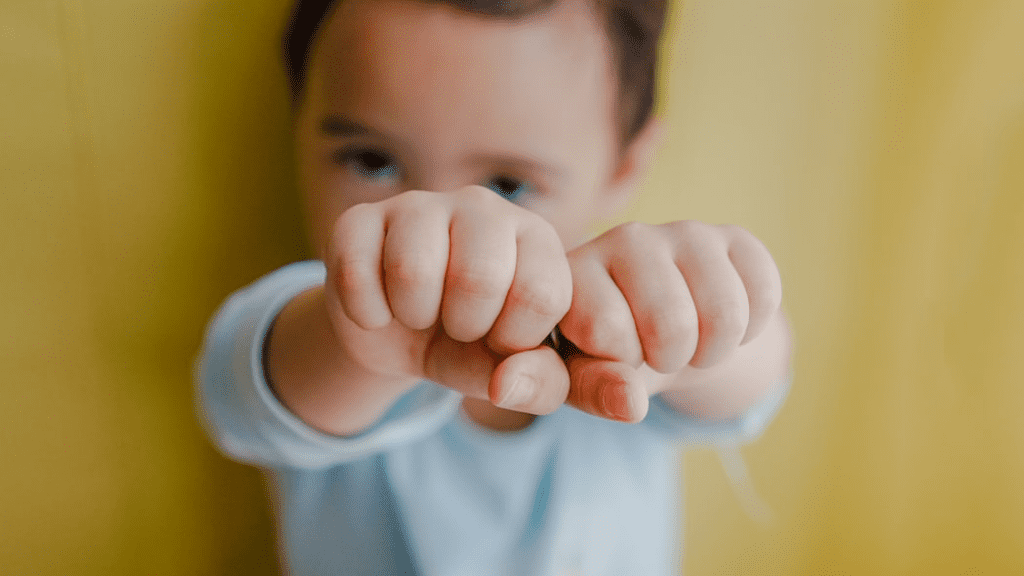
Table of Contents
Biting nails is a habit that toddlers often pick up. It can be annoying, unsightly, and even harmful to their health. Just like thumb sucking, biting nails too will go away on its own over time. But what if the nail-biting stays? We know people of our age biting their nails too. So here we have some tips to nab this habit in the bud.
Why is My Toddler Biting Nails?
It is estimated that about 30 to 60 percent of teens and kids bite their nails, which means your kid isn’t alone. So why is your toddler biting nails? As stated in the source above, biting nails may occur in kids due to genetic factors amongst other reasons. Your toddler can also be biting their nails because of the attention they get when you ask them to stop.
However, the causes of nail-biting have been pinned down to habit. This repeated behavior is unknown to the child. Such habits develop due to the following reasons:
- Boredom: A bored toddler will start nibbling on their nails as there is nothing more pressing to do.
- Relief: Toddlers biting nails must be responding to stress. Watch out for whatever is causing them this emotion.
- Relaxant: Some toddlers suck their thumbs to fall asleep while others bite their nails for the calming effect that it produces.
Should I Be Worried About a Toddler Biting Nails?
Habits that toddlers pick up wear off themselves over time so usually there is no need to be worried. As for the dangers of biting nails, kicking the habit might be worth it. Hangnails are not the only result of biting nails, infections and tooth issues also tend to develop eventually. Hangnails might be a minor issue but tooth problems and infections might cause your child major discomfort.
How to Stop Your Toddler From Biting Nails: 7 Strategies to Try
Stopping all kinds of habits needs an excessive amount of self-control and when you are dealing with a toddler who has picked up a habit you need double the dose of self-control: your sand your toddler’s. Here are 7 strategies to help kick a habit away.
1. Make Your Child Understand
Your toddler won’t know they have picked up a habit until he or she realizes it themselves. Plus, they need some motivation to stop biting their nails or stopping any kind of repeated behavior.
The first step to make sure your toddler listens to you is to help them feel you are on the same team as them and not against them. Help your kid understand that biting nails is a habit that is worth stopping. Make them understand that it could lead to tooth problems and infections. Talk to them about hygiene, i.e., touching things with the fingers that they have put in their mouth and also putting their fingers in their mouth after it has touched things that may be dirty.
2. Cut Their Nails Short
Your kid cannot bite what is not there so keep your kid’s nails trimmed. Short nails also ensure that dirt and bacteria caught under them do not get into your child’s body system.
3. Create a Code to Stop Biting Nails
This might turn out to be fun and conspiratorial for your child. Instead of telling them to just stop biting their nails, choose a secret code that you can use to remind them to stop biting their nails. Such options include a whistle, a touch on the shoulder, or a particular word that you mutually decide.
4. Suggest Substitutes
Keep your child’s hands busy with other things like offering them rubber balls, a piece of fabric, or Silly Putty to hold. This will work especially if they are biting their nails due to anxiety or stress.
5. Use a Reward System
Offer your toddler a small reward or put a star on a sticker chart every day they do not bite their nails. At the end of the week, have your toddler choose a prize. This exercise will not only make them eventually stop their nail-biting habit but also teach them patience, the ability to deal with stress or anxiety, and to be motivated. The rewards needn’t be big, maybe a sticker or a fun nail-painting session.
6. Do Fun Boredom-Busting Activities
If you find out that your tiny tot is biting nails out of boredom, come up with fun activities like pillow forts, pretend play, blank drawing pads, or coloring books. All these activities will serve a double purpose. They’ll foster creativity as well as leave no time for nail-biting.
You can encourage independent play and also distract your toddler from the habit by baking or cooking together, taking them to the park, or working on a puzzle together.
7. Apply Bite-Averting Nail Polish
Painting nail polish must be the last resort to stopping toddlers from biting their nails. Before you use this, make sure you tell your toddler what it means. The burning taste of the nail polish will stop your kid from biting their nails and make sure your kid gets conscious of their habit.
The downside of this technique to make your child quit biting nails is that your child may get the taste of nail polish while they put their hands in their mouths for other purposes like eating.
What to Never Say to Your Nail Biting Toddler
On the days when your child is biting their nails non-stop, you might be tempted to say or do things that would not do well with your kid and make things worse. Punishments, yelling, long lectures, endless reprimands will never encourage your toddler to stop biting their nails. This negative attention will make your kid determined to show who the boss of those nails are or worse cause them more stress and anxiety if they are not having it already which will only prolong this repeated behavior.
Toddlers between the ages of 2 and 3 years are at a developmental stage of autonomy and doubt or shame on the other side. So at this stage, he or she is working towards attaining independence which means toddlers who are deprived of this independence might begin to doubt their abilities leading to low self-esteem and shame-filled feelings.
Hidden Facts About Nail Biting Toddlers
The social relationships of toddlers biting nails may become affected or this habit could interfere with their daily functioning. You will notice these changes happening when your toddler complains about other kids teasing them about their bitten nails.
Nail-biting has also been found to cause physical ramifications which can lead to nail infections caused by bacteria that might enter the damaged skin around the nails or painful ingrown nails.
Chronic nail biters damage their teeth and their nail beds. These are rare occurrences, however, found mostly in adolescents. This condition is called onychophagia and research shows that it may be treated with oral devices that help in breaking this habit.
Be aware of a toddler who is adding such repetitive behavior into their repertoire such as picking their nose, sucking their thumb, or twisting their hair as they could be suffering from anxiety. Do spend one-on-one time with your toddler to build a strong parent-child relationship so they share whatever is going on in their world.
The Bottom Line: How to Stop Toddlers From Biting Nails?
Your toddler will probably outgrow this habit of chewing their nails but you can always try to stop them early as they could grow into a response to stress or anxiety. The strategies include good communication, patience, and positive reinforcement for both you and your child. If you are very much concerned about this repetitive behavior of your toddler because it is affecting their social relationships or health, talk to a pediatrician.
How to Stop Toddler from Biting Nails FAQs:
1. Is a toddler biting nails a sign of ADHD?
2. Why are toddlers biting their nails?
3. How do I know if my toddler has anxiety?
4. Will shouting to curb habits damage my child?
5. Is nail-biting a medical condition?
Reviewed By:

Nimrat Sidhu - Pediatration
Dr. Nimrat S Sidhu is a practicing pediatrician for about 5 years now and holds an MD pediatrics degree. She was the topper of her batch, has always had a keen interest in her core medical field, and is specially trained for neonatal resuscitation.
She has published multiple research papers on pediatrics and is interested in topics like Neonatal care, skincare, baby growth, vaccination, growth, and development.









